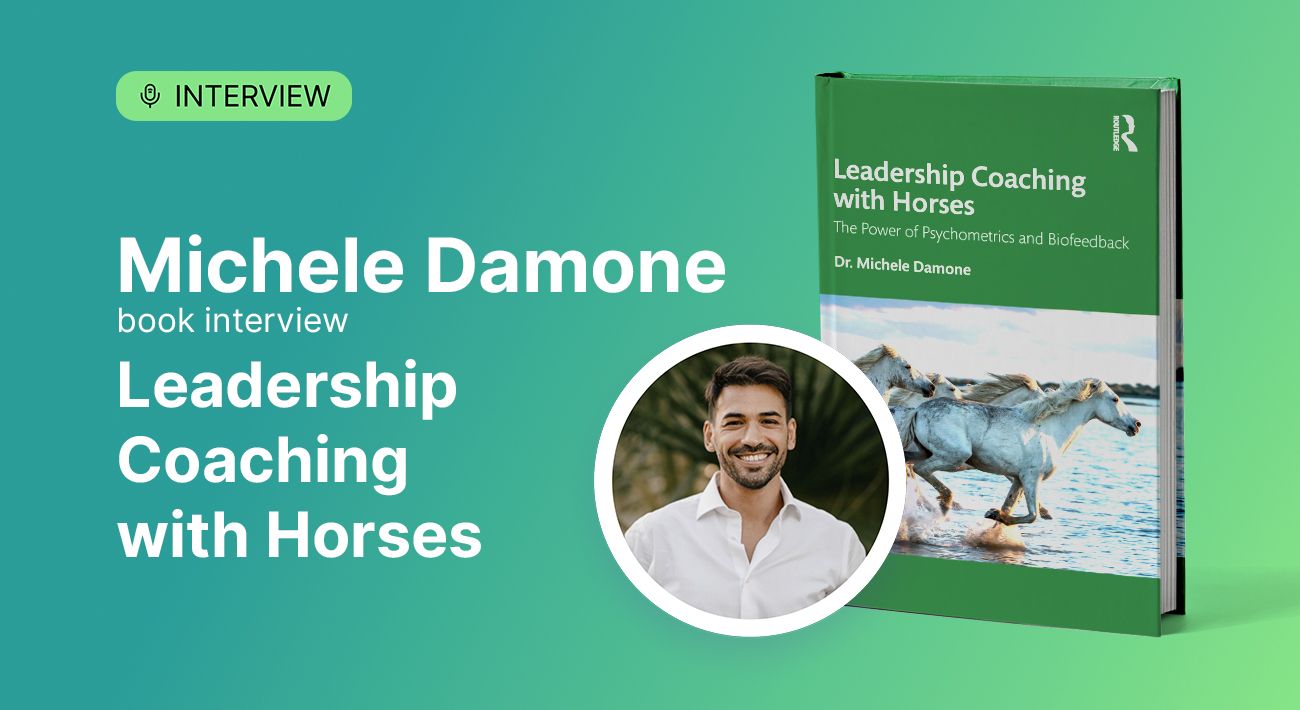A conversation with Michele Damone

"Leadership is less about control and more about connection."
Leadership has always been about navigating complexity, fostering connection, and inspiring others. But what if your greatest teacher wasn’t human, but a 1.000-pound horse? Michele Damone, in his groundbreaking book Leadership Coaching with Horses: The Power of Psychometrics and Biofeedback, introduces a revolutionary approach to leadership development. Combining equine-assisted learning with cutting-edge biofeedback and psychometric tools, Damone creates a methodology that is as intuitive as it is data-driven.
This book is a must-read for coaches, HR professionals, and leaders seeking innovative, measurable, and transformative strategies to elevate their leadership practices. By merging experiential learning with measurable insights, Damone offers an approach that is both profoundly personal and professionally impactful.
For a detailed review of the book and why it’s essential for every coach’s library, visit the following link: Leadership Coaching with Horses: the power of psychometrics and biofeedback, by Dr. Michele Damone.
I had the privilege of speaking with Michele Damone about his inspirations, methodologies, and vision for the future of coaching. Here’s what he had to say:
Q. What inspired you to write this book?
This book was inspired by my work as both a coach and a leader. Too often, I’ve witnessed the profound impact of combining the insights from working with horses and metrics - it inspires leaders and delivers quick, measurable results, saving them time and money. The blend of experiential learning and measurable data provides leaders with actionable insights they can immediately apply.
Q. Can you share how your background in criminology and behavioural science shaped your approach to leadership coaching?
My background brought a diagnostic component and scientific rigor to my coaching methodology - qualities often required by companies to understand their ROI. It’s like a doctor prescribing medicine and then observing the fever pass. Coaching becomes measurable, impactful, and accountable. This approach helps organizations track and assess improvements, making the intangible benefits of coaching tangible and credible.
Q. How does Leadership Coaching with Horses stand out among other coaching methodologies?
This approach uniquely offers kinaesthetic and experiential learning, which is often missing in corporate environments confined to dry office settings. By working with horses, leaders experience hands-on, embodied learning that stays with them. Combine this with psychometric and biometric tools, and you have a holistic methodology integrating experiential insights with powerful, data-driven feedback for the benefit of leaders and companies.
Q. How have you personally grown as a leader through your work with horses?
Horses have taught me the importance of staying grounded and focused, even amidst crises or constant change. Their gentleness has boosted my presence, enabling me to lead with greater authenticity and empathy. These lessons have been invaluable for navigating the complexities of modern leadership.
Q. What do you consider the most transformative insight in your book for coaches?
The most transformative insight is that leadership is less about control and more about connection. Horses teach us to lead with clarity, consistency, and authenticity - qualities essential for inspiring trust and collaboration.
Q. How can coaches incorporate biofeedback and psychometric tools into their existing practices?
These tools allow coaches to provide their clients and companies with real data to establish a baseline, focus on targeted coaching interventions, and measure progress. Organisations can assess not just individual performance but also factors like organisational well-being and collective performance, ensuring coaching aligns with broader business objectives.
Q. What advice do you have for leaders hesitant to explore non-traditional coaching methods?
The world of work is in constant flux, and non-traditional methods help leaders adapt to similar changes in their roles. Approaching these methods with curiosity opens the door to transformative insights that traditional approaches often miss.
Q. What would you like readers to take away as the core message of your book?
The core message is that leadership begins within. By embracing authenticity, emotional intelligence, and self-awareness, leaders can unlock their full potential. In the latest chapters, I explore stoic philosophy and the concept of Unity, which I believe are essential for the future of leadership. While psychological safety and DEI are crucial today, Unity will bind these elements together - creating workplaces where collaboration, empathy, and purpose thrive holistically.
Q. In what ways do you think the coaching profession will evolve in the next few years, and how can coaches prepare for these changes?
Coaching will become more interdisciplinary, integrating technology, neuroscience, and behavioural data to personalise experiences. To prepare, coaches should stay curious, invest in continuous learning, and embrace innovation and new tools to meet the evolving needs of leaders and organisations.
Q. What advice would you give to new or aspiring coaches who are just starting their journey?
Find your niche and stay true to your values. Coaching is most impactful when it comes from a place of authenticity and passion. Seek mentorship and invest in developing both your technical skills and emotional intelligence.
Related Coaches
Join our newsletter to stay inspired & informed
Sign up for our newsletter and receive the latest coach updates, coaching news, expert advice, and exclusive offers straight to your inbox. Stay motivated and keep learning.